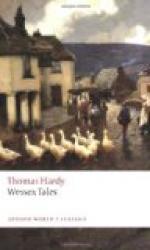By the time that he had arrived abreast of the shepherd’s premises the rain came down, or rather came along, with yet more determined violence. The outskirts of the little settlement partially broke the force of wind and rain, and this induced him to stand still. The most salient of the shepherd’s domestic erections was an empty sty at the forward corner of his hedgeless garden, for in these latitudes the principle of masking the homelier features of your establishment by a conventional frontage was unknown. The traveller’s eye was attracted to this small building by the pallid shine of the wet slates that covered it. He turned aside, and, finding it empty, stood under the pent-roof for shelter.
While he stood, the boom of the serpent within the adjacent house, and the lesser strains of the fiddler, reached the spot as an accompaniment to the surging hiss of the flying rain on the sod, its louder beating on the cabbage-leaves of the garden, on the eight or ten beehives just discernible by the path, and its dripping from the eaves into a row of buckets and pans that had been placed under the walls of the cottage. For at Higher Crowstairs, as at all such elevated domiciles, the grand difficulty of housekeeping was an insufficiency of water; and a casual rainfall was utilized by turning out, as catchers, every utensil that the house contained. Some queer stories might be told of the contrivances for economy in suds and dish-waters that are absolutely necessitated in upland habitations during the droughts of summer. But at this season there were no such exigencies; a mere acceptance of what the skies bestowed was sufficient for an abundant store.
At last the notes of the serpent ceased and the house was silent. This cessation of activity aroused the solitary pedestrian from the reverie into which he had lapsed, and, emerging from the shed, with an apparently new intention, he walked up the path to the house-door. Arrived here, his first act was to kneel down on a large stone beside the row of vessels, and to drink a copious draught from one of them. Having quenched his thirst he rose and lifted his hand to knock, but paused with his eye upon the panel. Since the dark surface of the wood revealed absolutely nothing, it was evident that he must be mentally looking through the door, as if he wished to measure thereby all the possibilities that a house of this sort might include, and how they might bear upon the question of his entry.
In his indecision he turned and surveyed the scene around. Not a soul was anywhere visible. The garden-path stretched downward from his feet, gleaming like the track of a snail; the roof of the little well (mostly dry), the well-cover, the top rail of the garden-gate, were varnished with the same dull liquid glaze; while, far away in the vale, a faint whiteness of more than usual extent showed that the rivers were high in the meads. Beyond all this winked a few bleared lamplights through the beating drops—lights that denoted the situation of the county-town from which he had appeared to come. The absence of all notes of life in that direction seemed to clinch his intentions, and he knocked at the door.




